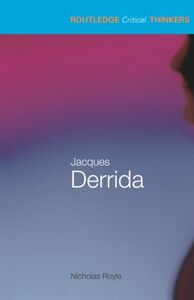Take a photo of a barcode or cover
challenging
informative
mysterious
medium-paced
An appropriately mind-bogging introduction to Derrida's thought that would irritate and infuriate a majority of its readers, but would be have it any other way? How can we possibly have a straightforward boilerplate listing of "key ideas" for somebody as revolutionary as Derrida? It is an invigorating text, which makes for an exceptional reading experience. It is a book one should return to again and again, preferably with a notebook and a pen, because there's just no damn way you got everything the first time. But quite definitely, this is simply not the book you should be reading if you have your paper on Deconstruction or Post-Structuralism the next morning, and in this, it is very different from a lot of the books in this series.
challenging
informative
inspiring
reflective
slow-paced
i may need a couple of days of sorting through my notes and the work of my highlighter before i can begin explaining what this whole book was about. all i can say right now is that i do feel like i've learned something--even more so considering i knew next to nothing about derrida's work or ideas. still, i can't help feeling relieved as well that my dissertation supervisor did not recommend me deconstructionism for my theoretical framework.
I've come to appreciate this series, these compact little books are a great way to introduce you to the main ideas of a modern thinker before you go on to explore their theories and writings. With Derrida I needed this help more than usual because although the french philosopher writes beautifully the content of his work is often mind boggling and confuses the hell out of me.
'Jacques Derrida' by Nicholas Royle is a book in the Routledge Critical Thinkers series which has set rules of presentation. First the book must open with a 'Why thinker?', then the thinker's key ideas are explained, and then the book ends with an 'after thinker'. Royle plays with this style, by first deconstructing the ideas of the series which then opens up the text to a vast number of interpretations. For example, the question of 'why Derrida?' can be considered in many ways, the most immediate response would be 'why should we read Derrida?' but contained within the first question are ideas such as 'why does Derrida exist?' and 'why should there be such a thing as Derrida?', the question is then ontological and the context changes.
This unique presentation of Derrida's ideas remains 'authentic' to Derrida's theories, particularly around deconstruction, and therefore could be seen in some ways as a post-deconstructive introduction to the deconstructive thinker. Which, ironically, I am not doing now as I am referring to 'Derrida' as a unified, singular thing, and referring to deconstruction as inherently 'Derridean, or as Derrida's'.
While this text is intended to be an introduction, a survey, and in some areas a rough ouline of Derrida it still remains 'Derridean' in style. So, when compared to other books which have a similar intention, such as Penelope Deutscher's 'How to Read Derrida' this book not only gives a more complete survey of Derrida's ideas but it also invites the reader to read a pseudo-Derridean text.
Afterword: For a book with a section titled 'after Derrida' there is an eerie presence of Derrida within the book (besides the inclusion of his writings in the text), in the format of a review at the beginning: 'Excellent, strong, clear and original'.
This unique presentation of Derrida's ideas remains 'authentic' to Derrida's theories, particularly around deconstruction, and therefore could be seen in some ways as a post-deconstructive introduction to the deconstructive thinker. Which, ironically, I am not doing now as I am referring to 'Derrida' as a unified, singular thing, and referring to deconstruction as inherently 'Derridean, or as Derrida's'.
While this text is intended to be an introduction, a survey, and in some areas a rough ouline of Derrida it still remains 'Derridean' in style. So, when compared to other books which have a similar intention, such as Penelope Deutscher's 'How to Read Derrida' this book not only gives a more complete survey of Derrida's ideas but it also invites the reader to read a pseudo-Derridean text.
Afterword: For a book with a section titled 'after Derrida' there is an eerie presence of Derrida within the book (besides the inclusion of his writings in the text), in the format of a review at the beginning: 'Excellent, strong, clear and original'.


